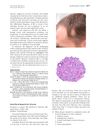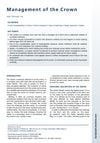 11 citations,
January 1991 in “Urology”
11 citations,
January 1991 in “Urology” New hormonal treatments for enlarged prostate show promise for safer, effective non-surgical options.
 10 citations,
March 2015 in “PubMed”
10 citations,
March 2015 in “PubMed” Scalp micropigmentation, a cosmetic tattoo technique, is a promising non-surgical treatment for hair and scalp deformities, despite potential complications.
 9 citations,
January 1989 in “Sen'i Gakkaishi”
9 citations,
January 1989 in “Sen'i Gakkaishi” Wool and hair fibers absorb moisture similarly due to their keratin structure, with the amount of non-crystalline areas affecting the moisture uptake.
 5 citations,
February 2015 in “Dermatologic Surgery”
5 citations,
February 2015 in “Dermatologic Surgery” Two cases of a rare skin condition were successfully treated with laser therapy, offering a non-surgical treatment option.
4 citations,
February 2018 in “EMBO reports” New DNA analysis and machine learning are advancing forensic science, improving accuracy and expanding into non-human applications.
 1 citations,
September 2023 in “JCEM case reports”
1 citations,
September 2023 in “JCEM case reports” GnRH analogues are effective for diagnosing and treating female androgen excess, offering a non-surgical option.
 1 citations,
June 2023 in “Advances in therapy”
1 citations,
June 2023 in “Advances in therapy” Ripretinib is effective and safe for treating advanced GIST in Chinese patients, particularly for non-gastric GISTs.
 1 citations,
January 2023 in “Aesthetic surgery journal”
1 citations,
January 2023 in “Aesthetic surgery journal” Facial plastic surgeries and aesthetic procedures are becoming more popular in India, with a preference for non-surgical options and effective treatments for facial enhancement and hair loss.
 1 citations,
October 2022 in “Asian journal of medical sciences”
1 citations,
October 2022 in “Asian journal of medical sciences” Trichoscopy is a valuable, quick, and non-invasive tool for diagnosing tinea capitis in children.
 1 citations,
February 2022 in “Scholars international journal of traditional and complementary medicine”
1 citations,
February 2022 in “Scholars international journal of traditional and complementary medicine” The herbal hair gel is effective, eco-friendly, and non-irritating with antifungal properties.
 1 citations,
February 2020 in “Journal of Cosmetic Dermatology”
1 citations,
February 2020 in “Journal of Cosmetic Dermatology” Hair transplant surgery reduces scalp sensitivity by almost 40%, and smokers have less scalp sensitivity than non-smokers. The time since surgery doesn't significantly affect this.
 1 citations,
September 2017 in “Journal of Pathology of Nepal”
1 citations,
September 2017 in “Journal of Pathology of Nepal” Testing hair roots with a special dye is a simple, non-invasive way to check disease progress in pemphigus vulgaris patients.
 July 2023 in “International journal of advanced research in medical and pharmaceutical sciences”
July 2023 in “International journal of advanced research in medical and pharmaceutical sciences” The gel combining minoxidil and Aloe vera could be an effective, non-irritating treatment for hair loss.
 March 2023 in “Journal of skin and stem cell”
March 2023 in “Journal of skin and stem cell” Trichoscopy is a good, quick, non-invasive way to diagnose different types of hair loss.
 October 2022 in “Springer eBooks”
October 2022 in “Springer eBooks” The document concludes that personalized hormonal treatments are important for transgender individuals and more research is needed for non-binary treatments.
 May 2021 in “Pakistan Journal of Medical and Health Sciences”
May 2021 in “Pakistan Journal of Medical and Health Sciences” Trichogram is useful for diagnosing hair disorders, but newer, non-invasive methods like trichoscopy are becoming more popular due to their sensitivity and ability to monitor treatment responses.
 May 2021 in “British Small Animal Veterinary Association eBooks”
May 2021 in “British Small Animal Veterinary Association eBooks” If a dog's skin tests are normal but it has hair loss, consider other non-endocrine causes and choose tests based on the hair loss pattern.
 October 2018 in “Emergency medicine news”
October 2018 in “Emergency medicine news” A 65-year-old man with sudden abdominal pain and seizures was diagnosed with a rare, non-traumatic splenic rupture and treated without surgery.
The chapter concludes that certain skin diseases in bovines cause symmetrical, non-painful lesions and temporary hair loss due to stress.

Surgeons should evaluate new technologies critically, offer a range of services including non-surgical options, and be aware of marketing influences to meet patient needs and maintain a successful practice.
 September 2014 in “Springer eBooks”
September 2014 in “Springer eBooks” The document concludes that breast pain should be managed with personalized treatment, starting with non-drug methods and progressing to medication if necessary, while considering side effects and patient needs.

The man has Temporal Triangular Alopecia, a stable, non-scarring hair loss condition best treated with hair transplantation.
 January 2011 in “Side effects of drugs annual”
January 2011 in “Side effects of drugs annual” Tretinoin gel is safe for sun exposure, but tacalcitol doesn't significantly improve non-segmental vitiligo.
 February 2008 in “Experimental dermatology”
February 2008 in “Experimental dermatology” Oxidative stress plays a significant role in vitiligo, and both skin and non-skin cells may be involved.
 76 citations,
January 2007 in “American Journal of Clinical Dermatology”
76 citations,
January 2007 in “American Journal of Clinical Dermatology” Women with PCOS often have skin problems like excessive hair, acne, hair loss, and dark patches, which can be treated with hormonal and non-hormonal therapies.
 58 citations,
January 2015 in “International Journal of Trichology”
58 citations,
January 2015 in “International Journal of Trichology” Platelet-rich plasma, which carries growth factors, could be a promising treatment for non-scarring hair loss, promoting hair growth and density with no major side effects.
 23 citations,
January 2003 in “Journal of Pediatric Endocrinology and Metabolism”
23 citations,
January 2003 in “Journal of Pediatric Endocrinology and Metabolism” About 15% of US Army personnel use hair products containing hormone or placenta, with higher usage among non-whites, females, and enlisted personnel.
 8 citations,
September 2020 in “Journal of Cosmetic Dermatology”
8 citations,
September 2020 in “Journal of Cosmetic Dermatology” More people are searching for hair transplants online, preferring Follicular Unit Excision over Follicular Unit Transplant. There's also a rise in female patients and interest in beard, eyebrow transplants, and non-surgical treatments like platelet rich plasma.
 2 citations,
August 2013 in “Facial Plastic Surgery Clinics of North America”
2 citations,
August 2013 in “Facial Plastic Surgery Clinics of North America” Treat the front and middle scalp before the vertex in hair transplants, aim for good density, use non-surgical options for young people, and customize treatment for natural results.
 March 2024 in “International journal of pharmaceutical sciences and drug research”
March 2024 in “International journal of pharmaceutical sciences and drug research” Androgenetic alopecia is influenced by various factors and can be treated with medications, procedures, and non-drug methods.




























